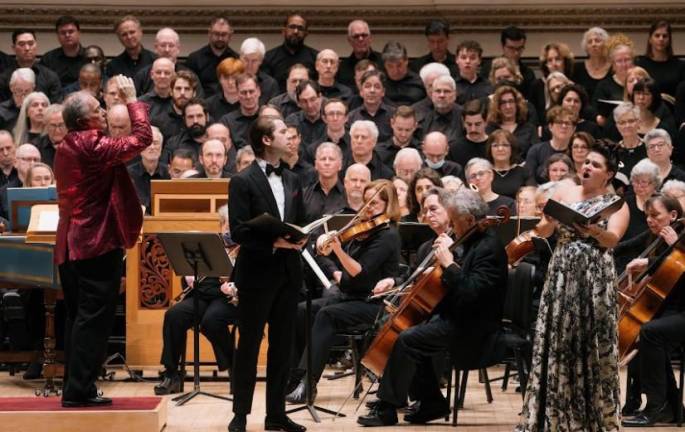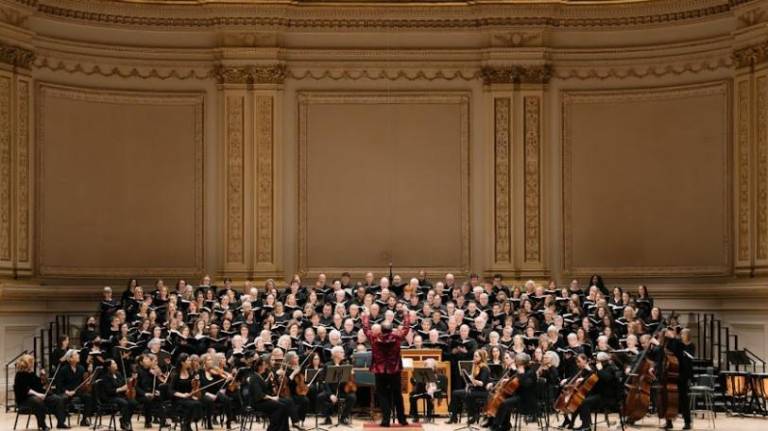Handel’s Messiah Still Mesmerizing at Its Annual Sold Out Carnegie Hall Performance
A public high school senior makes his first ever visit to Carnegie Hall and is moved by the annual performance of Handel’s “Messiah” by the Oratorio Society of New York. The all volunteer orchestra has played at the famed concert hall for 139 years.


The Oratorio Society of New York: an all volunteer, 176 member choir that includes four solo singers a 33-piece orchestra of strings, winds and brass, an organ and harpsichord, performed Händel’s most famous, “Messiah,” on Dec. 19th as they have for the past 149 years.
It was my first time at Carnegie Hall and the mood of the overflowing crowd was festive. People waiting to get in on 57th St. shouted into the crowd that was made up of a mostly elderly white folks greeting friends and family while hustlers hawked extra tickets to the sold out show.
“Messiah” was written in only 18-24 days despite it being two-and-a-half hours long. Its classical German composer, the famed Georg Friedrich Händel, at the time of its writing in the late London summer of 1741 was broke and angry but inspired. Locked away into a room largely without food or sleep, he recycled some of his earlier works into the masterpiece.
The lyrics, a collage of verses from the Old and New Testament, follow the life of Jesus Christ from prophecy to death and resurrection. Messiah’s text was written in English, unlike the usual German or Italian, making it popular for its very first performance in Dublin in April of 1742, as an Easter oratorio.
It wasn’t until the mid 19th century that Messiah became a December tradition. Back then, there simply wasn’t enough good Christmas music to get people in the holiday mood.
Fast forward to Christmas night of 1874 at New York’s Steinway Hall. Only a year before the Oratorio Society of New York was founded by German immigrant Leopold Damrosch, they were now to perform the monumental “Messiah.” They did very well, so well that htye have performed nearly every year since.
In 1891, just a few months after the construction of Carnegie Hall, OSNY’s “Messiah” was conducted in its auditorium. They have continued to perform there every year since, except on two occasions.
Monday night marked OSNY’s 149th presentation of “Messiah,” the 130th at Carnegie Hall.
“We perform on Mondays because Broadway is dark, giving us full-access to the best of New York City’s freelance orchestra players,” says Erica Jacobsohn, Executive Director of OSNY.
Isaac Stern Auditorium/Ronald O. Perelman Stage was nearly full to its last of its 2,200 seats.
The four soloists, three males dressed in black and one female in an outstanding green dress came on stage to a loud reception. Close behind them in a sparkling red blazer followed Kent Tritle, the renowned conductor, head of OSNY as well as two other NYC choirs.
The famous opening melody was played and I knew then that my emotions were now at the mercy of the Lord and Maestro Tritle’s movements, river-like, at times soft streams, at times crashing waves.
Martin Bakari, the “golden tenor,” as Opera News called him, was the first soloist to rise and take center stage. Bakari told the movement’s great prophecy in jumpy staccato movements as if he were taken by some supernatural force.
Introduced by the choir’s verse “the glory of the Lord,” deep baritone John Brancy was next into the center. Most of his words I could not decipher but I felt moved nevertheless.
Some of the choir members have been singing in choirs all their lives, many studied music in college but followed a career elsewhere. Two annual auditions, open to anyone, are the gateway into the Oratorio Society of New York, and as volunteers, their performances are unpaid.
Next, the multi-award winning Daniel Moody, a high-pitched countertenor, sang “Behold, a virgin shall conceive.” It is nearly unheard of that a man sings these verses and yet Moody hit and held every note with passion.
When Moody looked into the heavens at his last word, the army of 176 voices rose behind him at the command of the Maestro’s hand. “Behold your God!” they sang.
Then, as to be expected, Kathryn Lewek, a soloist with the voice of an angel takes the stage. She’s described in the program as “this generation’s most thrilling coloratura soprano.” I have never heard notes so clear and she delivered every one on a silver platter. Aside from performing the Queen of the Night from Mozart’s “Magic Flute” over 300 times around the world, this is her seventh time singing for OSNY’s “Messiah.”
Several movements later, nearing the finale, came the beloved Hallelujah chorus:
Haaaaaaaallelujah! Hallelujah! Hallelujah! Halleluuuuu-uuuuu-jah!
“I did see all Heaven before me, and the great God himself!” Händel said about writing this particular passage.
The entire audience only came to their feet at the chorus’ final note. During Messiah’s 1943 London premiere, King George II was moved to stand by the beauty of this passage and out of respect for their King, the audience followed. It has been a tradition ever since.
Händel’s oratorio came to a prolonged ending with several repetitions of the word “Amen” and a roaring, standing ovation. Practically ignoring the other soloists, Maestro Tritle took Kathryn Lewek into his arms and planted a kiss on her cheek.
Noah Augustin, currently a senior in a New York City public high school, was born in Germany to Jewish and Haitian parents and currently lives on the UES of Manhattan.